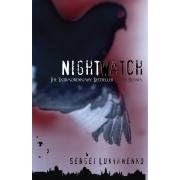Fiction, Fantasy (translated)
This Russian series has given birth to a trilogy of European movies that have won great acclaim. It is about the long battle between the forces of the Light and the Dark, in the form of people called the Others. The Others are those who can go into the Twilight, and once they are initiated there, the Twilight draws out which side the Other will be upon. If truth be told, the mental state of the Other
at that moment is the guiding factor, so the forces of the Light and the forces of the Dark watch very carefully for potentials, each hoping to initiate a person at the correct time.
Both sides have to be circumspect in their dealings, as a long-held truce is in place to keep both sides in check. Thus the forces of the Light have the Night Watch, to look over the dealings of the Dark, while those of the Dark have the Day Watch, to look over the dealings of the Light. An Other who works for the Night Watch may not turn a person toward the path of good without allowing an Other of the Dark a similar level of intervention. Both sides are watched over by the Inquisition, members of both sides who are alll too aware of the tragedy that an imbalance could cause.
This is backstory. Also part of the setting is the essential distinction between the two forces, that those of the Light truly believe that they are shepherding ordinary humans for an overall better world, while those of the Dark feel as though personal freedom is the most important ideal. It is worth noting that neither side requires attendance, and that the Light is, perhaps, a bit understaffed for the Night Watch, while the Dark has no trouble getting volunteers— or with going through them in a rather callous fashion.
This series primarily centers around the actions of Anton Gorodetsky, a member of the Night Watch who has only been an Other for perhaps seven years, and is thus still fairly human in his attitudes. There are several novellettes in each volume, each one leading to the final confrontation. Lukyanenko is quite clever in setting these confrontations up; none of them are quite what they seem, and all are plotted in a way that suggests mystery rather than dark fantasy. Anton is, in most of these tales, not supposed to be the central character, but he ends up understanding, perhaps, how the intricate machinations of both sides could lead to tragedy if comething goes wrong. He is in the position of the simple man who unravels the truth.
These novels, naturally enough, are set in and around Moscow, but aside from that, and the occasional hints of Russian history dropped in, there is little to confuse an American reader. Much props to the translator for his work on this series. Also do not be fooled by the copyright dates as these books were primarily written before 2002; a few cultural notes might seem strange otherwise.
One more note: these books are marketed as fantasy/horror, but in truth I found nothing in them as dark as, say, Charles De Lint. Certainly nothing on the level of Stephen King. So please, do not avoid them on that account.

